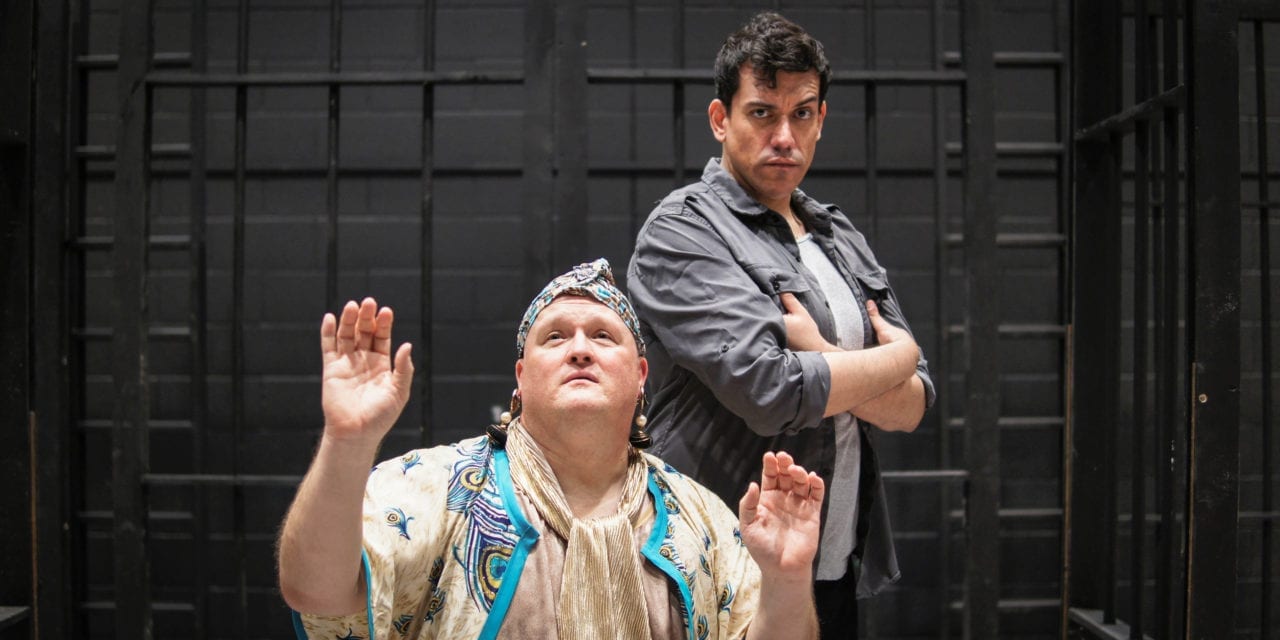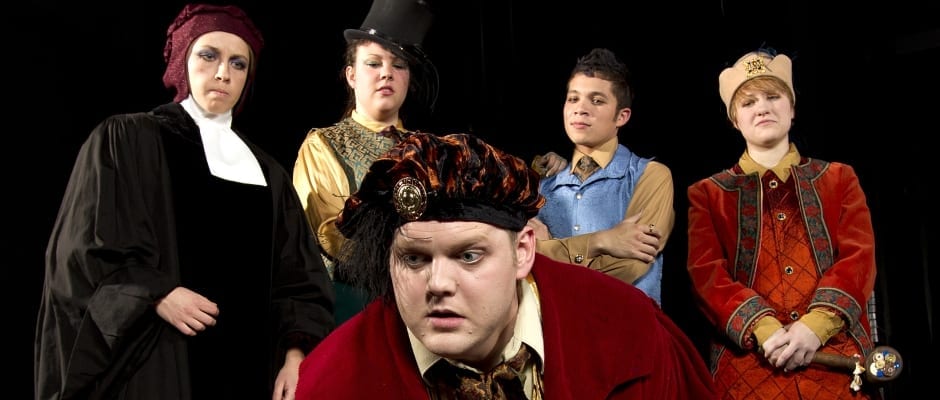SALT LAKE CITY — Already a fan of the works of John Kander and Fred Ebb (Chicago, Cabaret), I looked forward to my introduction to the Tony Award winning musical Kiss of the Spider Woman. And I am pleased to say I was not disappointed. This stunningly aberrant work is a practice in aesthetic as much as it is in the human experience, and I enjoyed living in its strange little universe for a spell.

Show closes May 7, 2017.
Based on a novel by Manuel Puig and with a script by Terrence McNally, Kiss of the Spider Woman tells the story of Luis Alberto Molina (played by Kenneth Wayne), a queer man in prison for unknowingly engaging in acts with a minor. In an effort to escape the pain and horror of prison life, Molina imagines his days away in a series of vignettes borrowed from movies he saw as a child, most of them starring his beloved muse Aurora, a sultry diva who now appears to him as the spectral Spider Woman (played by Erin Royall Carlson). Reality invades Molina’s shimmering world when he gets a new cellmate: a passionate Marxist revolutionary named Valentin Paz (played by Juan Pareira). Molina soon falls in love with Valentin, who himself realizes that he can use Molina’s devotion to his advantage. As fatal interrogations from the guards eliminate prisoners all around them, Molina is ever-aware of the lurking, virulent presence of the Spider Woman—his very own angel of death.
The first thing that should be noted is director Johnny Hebda‘s utilization of the small space. The Sorenson Unity Center has a restricted rectangular black box that doesn’t allow for much hoofing ground, but Hebda and his ensemble were able to institute a big Broadway feel in a teeny-tiny area without encroaching on the audience or looking cramped in any way. Choreographer Ashley Gardner Carlson also had a special challenge of getting her dancers around the space and up and down the platforms with grace and pizzazz, and it was accomplished wonderfully. I was delighted to see the skill level of the dancers, all of whom were electric onstage regardless of their diminutive roles in the story. The added trial of having to find a chorus of able and willing male dancers in this valley is one with which I am familiar, and I applaud Hebda and his team for pulling it off. Indeed, there seemed to be a myriad difficulties surrounding this production that could have weighed it down, but it managed to float like cream to the top of a barrel, effortlessly effervescent to the last drop.
![]()

Kenneth Wayne as Molina and Juan Pereira as Valentin. Photo by CJ Strong.
My very favorite element of the production was Wayne himself as the gender-fluid Molina. In a role that required grace and vulnerability, Wayne was, in a word, perfect. Every now and then I see an actor in a role that seems as though it was written just for them, and so it was in this case. Wayne carried Molina with gentle loveliness that was as endearing as it was magnetic, making me wish there was another two hours of just Molina, for I could have watched him for days. Weeks, even. I found myself feeling deeply for him in scenes with his mother, and when he was abused by effeminophobic guards, I just wanted to wrap him in a big hug and be his friend. Molina was very real to me, and a timely example of how far we still have to go in treatment of people who society condemns as different or abnormal.

Photo by CJ Strong.
As a powerful foil to Molina, Pareira’s Valentin was effectively masculine and vehemently aggressive. It took a moment for me to warm up to Pareira’s “always turned up to 11” delivery of Valentin, but his astonishing vocals and expressive face drove his character home in a way that I came to appreciate. He had a kind of Alfred Molina vibe that I liked—an imposing presence that danced on the line of cartoonish without crossing it. Pareira also had moments of lovely sincerity, particularly in the song “Over the Wall/Marta” that took him up into the rafters vocally, which he accomplished with sweet beauty. A scene that was directed especially well was his love scene with Molina, which was tender and surreal, something that had to be sold both in blocking and acting—a particular challenge for the heterosexual partner in the act—and Pareira had me sold on his character’s choice to go through with it. If I had one criticism, it is not in Pareira’s acting, but in his makeup, which was distracting through the first act of the play. I found myself wondering why a single line of blood would still be on him through weeks of captivity, thinking of ways the actor could wipe it off. (Perhaps a wet wipe in the pocket?) I understood the idea was constant abuse from the guards, but the logic of it didn’t quite match up. In the second act when the blood was at last wiped away, I breathed out an internal sigh of “oh, thank heavens.” It is a shame I was distracted from his lovely performance by this little mistake.
As the titular character, Carlson was delicious. I couldn’t take my eyes off her as she vamped, shimmied, and slinked her way around the stage, holding her own as the queen of all those men. There was a lovely star quality in her, her low, rich voice and graceful movement secondary to her luminous stage presence, which is exactly what I want in a diva. I was especially tickled when her comedic talents shone in the second act opener, a song describing a Russian film in which Aurora’s character dies most gallant for love. Her knack for physical and vocal comedy enriched the scene and the play as a whole, which was made more buoyant with her presence.
It was a rare treat to see Kiss of the Spider Woman on a Utah stage, and one I hope to experience again. I myself will definitely be making a second trip, and I admonish others to take advantage of this unusual little gem.





